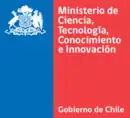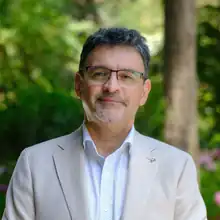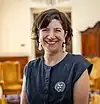Ministry of Science, Technology, Knowledge and Innovation
The Ministry of Science, Technology, Knowledge and Innovation[3] is the Ministry of State of Chile in charge of structuring, promoting, coordinating and promoting science, humanities and technological development activities in all their stages, to contribute to the sustainable development and social welfare of the country.[4] It was created as a replacement for the National Commission for Scientific and Technological Research, which was in charge of the Ministry of Education.[5] The current minister of the ministry is Silvia Díaz, who was appointed by Gabriel Boric on September 6, 2022.[6]
| Ministerio de Ciencia, Tecnología, Conocimiento e Innovación de Chile | |
 | |
| Ministry of Science overview | |
|---|---|
| Formed | August 13, 2018 |
| Jurisdiction | National |
| Headquarters | Santiago, Chile |
| Employees | 412 (2020)[1] |
| Annual budget | 430 704 553 thousands peso (2020)[2] |
| Minister responsible |
|
| Child agencies |
|
| Website | www |
| Agency ID | MICITEC MinCiencia |
It was created during the second government of President Sebastián Piñera promulgated on 27 July 2018, and published in the Official Journal on 13 August of the same year.[4] According to the norm, the President of the Republic had one year to set the date on which the ministry began to operate[4] and which replaced the National Commission for Scientific and Technological Research and the Superior Councils for Science and Technological Development.
History
The ministry was implemented from a national need for an institution that manages to coordinate efforts in science and technology.[7] Currently in Chile it is pointed out that there is a low scientific and social organization of science and technology,[8][9] the low state economic investment (0.34% of GDP in 2018)[10] and the political institutionality of knowledge generated by research in Chile.[11][12] National researchers and scientists have marched in 2017[13] and 2018[14] demanding improvements to science and technology from part of the government.[15][16]
On 1 October 2019, the ministry officially begins to function employing 45 permanent officials that include the Minister of Science, the Subsecretary of Science, the officials who helped form the ministry and the five SEREMIs that were appointed by the President of Chile; and by 2020 with nearly 100 employees, including those transferred from the Subsecretary of Economy and the Subsecretary of Education. Originally, their offices were at the Palacio de La Moneda;[17] however, in June 2021, the ministry moves from its offices in the Palacio de la Moneda to its new location on Calle Morandé, one block from the presidential palace.[18]
First minister's Announcement
After the announcement of the promulgation of the law that creates the ministry, there were many public comments about who could be the new minister of the portfolio; Among the most mentioned names were Hernán Cheyre, director of entrepreneurship at the Universidad del Desarrollo, Álvaro Fischer, member of the National Council of Innovation for Development, Mónica Rubio, Chilean astronomer at the University of Chile, and Mario Hamuy, president of CONICYT.[19]
On 17 December 2018, during the second government of President Sebastian Piñera, the president announced at La Moneda Palace that the neurobiologist[20] Andrés Couve Correa will be the first minister, while the biologist and executive director of the Millennium Scientific Initiative,[21] Carolina Torrealba, was appointed as the Subsecretary of the portfolio.[22]
Overview
According to what is dictated by the law that creates the ministry, its main job is to advise and collaborate with the President of the Republic in the drafting and application of policies, plans and programs that promote and strengthen science, technology and innovation that arises from research, with the purpose of contributing to national development, strengthening cultural, educational, social and economic heritage at various territorial scales. In addition, the ministry must seek methods to coordinate national regulations that promote research as well as to incorporate the knowledge generated by scientific-technological innovation in the development of public policies and public-private initiatives.[23]
On the other hand, it is also responsible for fostering the creation of infrastructure and institutions, the training of professionals and their insertion in the public and/or private environment, fostering the publication and linking of ongoing research with the environment, promoting the formation of scientific culture as well as its assessment and communication, promoting equitable gender participation, taking charge of international treaties, spatial research and development, preservation of the national scientific and technological heritage, among others.[23]
To achieve this, the ministry can propose public regulations, request research, award awards, develop activities focused on scientific dissemination, maintain a database on scientific and technological production and financing in the country, develop national standards regarding infrastructure and research, among other attributions.[23]
Organization
- Ministry of Science, Technology, Knowledge and Innovation
- Subsecretary of Science, Technology, Knowledge and Innovation, on which they depend:
- Regional Ministerial Secretaries of Science, Technology, Knowledge and Innovation.
- The five macrozones are Antofagasta, Valparaíso, Concepción, Valdivia y Punta Arenas.[17]
- Advisory Council of the Ministry of Science, Technology, Knowledge and Innovation
- Regional Ministerial Secretaries of Science, Technology, Knowledge and Innovation.
- National Research and Development Agency of Chile[17]
- National Council of Science, Technology, Knowledge and Innovation for Development
- Interministerial Committee for Science, Technology, Knowledge and Innovation
Lists of ministers
| N°. | Minister | Political party | Start date | Final date | President | ||
|---|---|---|---|---|---|---|---|
| 1 |  | Andrés Couve Correa | Ind. | 17 December 2018 | 11 March 2022 | Sebastián Piñera[24] | |
| 2 |  | Flavio Salazar Onfray | PCCh | 11 March 2022 | 6 September 2022 | Gabriel Boric | |
| 3 |  | Silvia Díaz Acosta | Ind. | 6 September 2022 | 10 March 2023 | ||
| 4 |  | Aisén Etcheverry Escudero | Ind. | 10 March 2023 | Incumbent | ||
References
- Dipres. "Anuario Estadístico del Empleo Público en el Gobierno Central 2011–2020" (PDF) (PDF) (in Spanish). Retrieved 29 January 2022.
- Dipres. "Ley de presupuestos del sector público Año 2020" (PDF) (PDF) (in Spanish). Retrieved 22 May 2020.
- "ANID al debe: por un desarrollo científico desde las artes". Ciper (in Spanish). 13 January 2022. Retrieved 26 February 2022.
- "Ley 21105 – Crea el Ministerio de Ciencia, Tecnología, Conocimiento e Innovación". Ley Chile – Biblioteca del Congreso Nacional (in Spanish). 13 August 2018. Retrieved 14 August 2018.
- Emol (30 October 2015). "Francisco Brieva y su salida de Conicyt: "Llevo seis meses sin recibir una remuneración"" (in Spanish). Retrieved 14 August 2018.
- "Gobierno de Chile: Ministerio de Ciencia, Tecnología, Conocimiento e Innovación". www.gob.cl (in Spanish). 2021. Retrieved 26 September 2022.
- Huerta, Luis (20 April 2018). "Una política científica para Chile, ¡ahora!" (in Spanish). El Mostrador. Retrieved 14 August 2018.
- "Ciencia en Chile. Más allá del problema del financiamiento y la institucionalidad". www.redseca.cl (in European Spanish). Retrieved 14 August 2018.
- Astudillo Besnier, Pablo (15 September 2017). "Ciencia para "nuestra realidad" o para "los indicadores": sobre la orientación de nuestro sistema científico" (in Spanish). CIPER Chile. Retrieved 14 August 2018.
- (FIN) DOP/CNA (14 June 2018). ""Inversión en innovación en América Latina debe llegar al 1.5% del PBI" [entrevista]" (in Spanish). Retrieved 14 August 2018.
- León, Gabriel (9 November 2015). "¿A quién le importa la ciencia en Chile?" (in European Spanish). La Tercera. Retrieved 14 August 2018.
- Facultad de Ciencias Físicas y Matemáticas. "Beauchef Magazine: Institucionalidad de la ciencia en Chile: visiones de algunos de sus actores – Universidad de Chile" (in Spanish). Retrieved 14 August 2018.
{{cite journal}}: Cite journal requires|journal=(help) - Cooperativa.cl (22 April 2017). "[Fotos] Así se vivió la "Marcha por la Ciencia" en Chile" (in Spanish). Cooperativa.cl. Retrieved 14 August 2018.
- El Mostrador Cultura (11 April 2018). "Convocan a marcha por la ciencia y el conocimiento en todo Chile" (in Spanish). El Mostrador. Retrieved 14 August 2018.
- Bajak, Aleszu (14 December 2017). "Chile's chance to embrace science for the twenty-first century". Nature. 552 (7684): S53–S55. Bibcode:2017Natur.552S..53B. doi:10.1038/d41586-017-08385-0. ISSN 0028-0836.
- Fraser, Barbara (21 December 2017). "Chile election reignites tussle over science policy". Nature. doi:10.1038/d41586-017-08925-8. ISSN 0028-0836. Retrieved 14 August 2018.
- Yáñez, Cecilia (1 October 2019). "Hoy comienza a funcionar "oficialmente" el Ministerio de Ciencia: 45 funcionarios este año y un centenar en 2020" (in Spanish). La Tercera. Retrieved 2 October 2019.
- Prensa (11 June 2021). "Artículo: Ministro Couve Recibe Primera Visita Oficial En Las Nuevas Instalaciones Del Ministerio De Ciencia" (in Spanish). Ministerio de Ciencia, Tecnología, Conocimiento e Innovación.
- El Mostrador (31 May 2018). "Cámara de Diputados aprobó la creación del Ministerio de Ciencia y Tecnología" (in Spanish).
- "Doctorado en Ciencias Biomédicas – Universidad de Chile – Claustro Académico Andrés Couve Correa". dcb.med.uchile.cl (in European Spanish). Retrieved 18 December 2018.
- "Carolina Torrealba Ruiz-Tagle – Fundación Chile". Fundación Chile (in European Spanish). Retrieved 18 December 2018.
- Silva, Daniela (17 December 2018). "Andrés Couve es el nuevo ministro de Ciencia, Tecnología, Conocimiento e Innovación" (in Spanish).
- "Ley 21105 – Crea el Ministerio de Ciencia, Tecnología, Conocimiento e Innovación". Ley Chile – Biblioteca del Congreso Nacional (in Spanish). 13 August 2018. Retrieved 14 August 2018.
- Seguel A., Natalia (13 August 2018). "Entró en vigencia la ley que crea el Ministerio de la Ciencia". Radio Agricultura (in Spanish). Retrieved 14 August 2018.